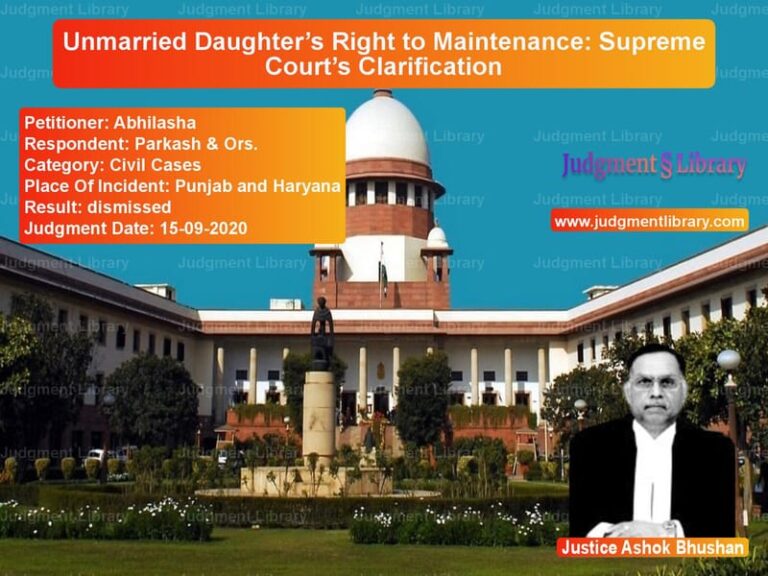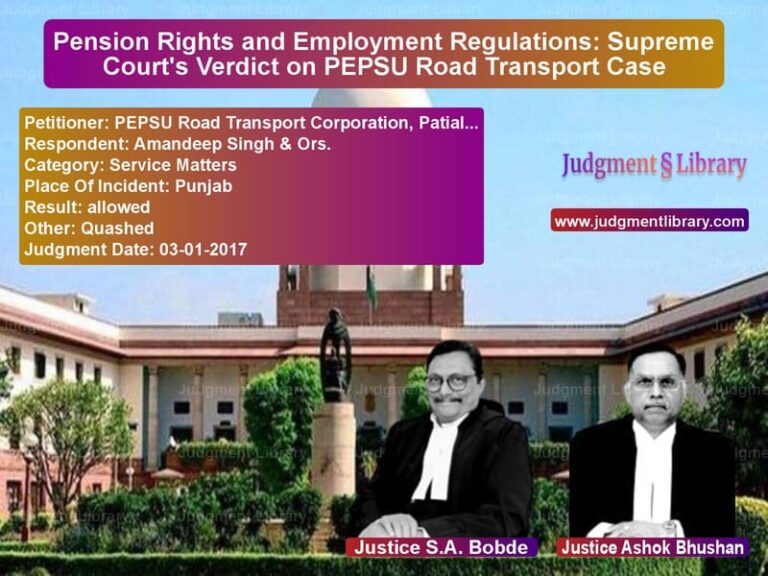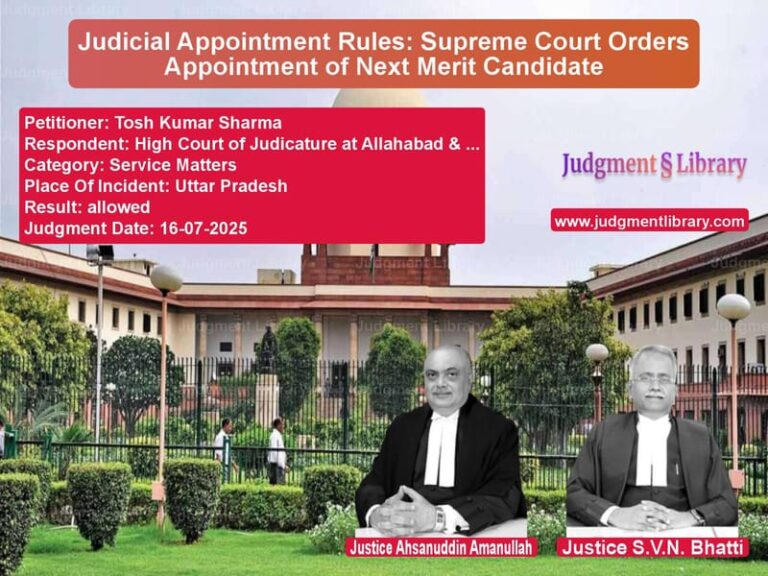Teacher Recruitment Case: Supreme Court Upholds Eligibility of Open University Degree
Introduction
The Supreme Court of India, in the case of State of Andhra Pradesh & Ors. v. Shaik Mahibulla Sharief, addressed the eligibility of a candidate possessing a degree from Dr. B.R. Ambedkar Open University for recruitment as a Language Pandit (Telugu). The State of Andhra Pradesh had rejected the respondent’s application on the grounds that his qualification was not equivalent to the prescribed eligibility criteria. However, the Supreme Court upheld the judgments of the Administrative Tribunal and the High Court, affirming that degrees from the Open University are valid for such recruitment.
The ruling is significant as it clarifies the recognition of degrees obtained through distance education, ensuring equal opportunities for candidates who pursue higher education from open universities.
Background of the Case
The case arose from the following events:
- The Andhra Pradesh government issued a notification for the recruitment of teachers in government schools.
- Shaik Mahibulla Sharief applied for the post of Language Pandit (Telugu) and secured rank No. 1195.
- His name was included in the provisional selection list under the B.C. (E) quota for East Godavari District.
- Despite being shortlisted, he was not selected for the final appointment.
- He filed an application with the Andhra Pradesh Administrative Tribunal, challenging his exclusion.
The Tribunal ruled in his favor, directing the State to consider his case for appointment. The Andhra Pradesh High Court upheld this decision. Aggrieved, the State government filed an appeal before the Supreme Court.
Key Legal Issues Considered
The Supreme Court examined the following legal questions:
- Whether a degree in Telugu literature as a single subject from Dr. B.R. Ambedkar Open University met the qualification requirements for recruitment.
- Whether the government had wrongly excluded the candidate despite his qualifications being recognized by the University Grants Commission (UGC).
- Whether the High Court had correctly interpreted the recruitment rules.
Petitioner’s (State of Andhra Pradesh’s) Arguments
The State contended:
- The recruitment rules required a Bachelor’s degree with Telugu as the main subject or one of the three equal optional subjects.
- A single subject degree from Dr. B.R. Ambedkar Open University was not equivalent to the prescribed qualification.
- The government had previously clarified in a memo dated 03.10.2005 that such degrees were not valid for promotions in the education department.
Respondent’s (Shaik Mahibulla Sharief’s) Arguments
The respondent countered:
- He had completed a B.A. degree in History, Economics, and Political Science along with a B.Ed. degree with Telugu and Social Studies as methodology subjects.
- He had also obtained a B.A. in Telugu literature as a single subject from Dr. B.R. Ambedkar Open University.
- The State had recognized similar degrees for DSC-2003 candidates, and there was no reason to exclude him.
Supreme Court’s Observations
The Supreme Court found the State’s arguments unconvincing. The Court stated:
“There is nothing in the Rules which makes a degree issued by Dr. B.R. Ambedkar Open University, which is recognized by the University Grants Commission (UGC), ineligible for consideration.”
The Court further emphasized that the State had previously accepted similar qualifications in other recruitment processes:
“If the Government has considered the degree issued by Dr. B.R. Ambedkar Open University as equivalent to any other degree for DSC-2003 and permitted appointment of similarly situated persons, there is no reason why the respondent can be said to be ineligible.”
The judgment also criticized the State for not seeking clarification from the University regarding the validity of the degree:
“The High Court rightly found fault with the Government in not seeking the opinion of Dr. B.R. Ambedkar Open University whilst determining the equivalence of the degree granted by it.”
Final Judgment
The Supreme Court ruled:
- The appeal filed by the State was dismissed.
- The State was directed to consider the respondent’s case for appointment.
- No costs were imposed on either party.
Significance of the Judgment
This ruling has important implications for education and recruitment:
- It affirms the recognition of degrees from open universities for government employment.
- It prevents arbitrary rejection of candidates based on technical interpretations of recruitment rules.
- It upholds the principle of fairness in selection processes.
Implications for Open University Graduates
The ruling provides assurance to graduates from open universities:
- Degrees obtained through distance education are valid for government recruitment if recognized by UGC.
- Candidates who face rejection due to qualification disputes can challenge such decisions.
- Government authorities must seek clarification before denying eligibility based on degree equivalence.
Conclusion
The Supreme Court’s decision in State of Andhra Pradesh & Ors. v. Shaik Mahibulla Sharief upholds the validity of open university degrees for government recruitment. The ruling ensures that candidates are not unfairly denied employment opportunities and reinforces the legitimacy of distance education programs. By dismissing the appeal, the Court reaffirmed the right of qualified candidates to be considered fairly in public sector employment.
Don’t miss out on the full details! Download the complete judgment in PDF format below and gain valuable insights instantly!
Download Judgment: State of Andhra Prad vs Shaik Mahibulla Shar Supreme Court of India Judgment Dated 22-02-2017.pdf
Direct Downlaod Judgment: Direct downlaod this Judgment
See all petitions in Recruitment Policies
See all petitions in Public Sector Employees
See all petitions in Judgment by S. A. Bobde
See all petitions in Judgment by L. Nageswara Rao
See all petitions in dismissed
See all petitions in supreme court of India judgments February 2017
See all petitions in 2017 judgments
See all posts in Service Matters Category
See all allowed petitions in Service Matters Category
See all Dismissed petitions in Service Matters Category
See all partially allowed petitions in Service Matters Category







